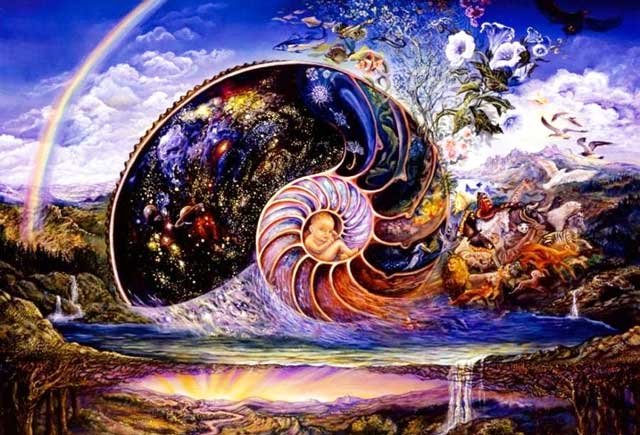All Main-steam Religeous Takes On REINCARNATION
---[-]--- Bible ---[-]---
It shows that man is the special creation of God, created in God’s image with both a material body and an immaterial soul and spirit. He is presented as distinct and unique from all other creatures—angels and the animal kingdom alike. The Bible teaches that at death, while man’s body is mortal, decays and returns to dust, his soul and spirit continue on either in a place of torments for those who reject Christ or in paradise (heaven) in God’s presence for those who have trusted in the Savior. Both categories of people will be resurrected, one to eternal judgment and the other to eternal life with a glorified body
---[-]--- Buddhism ---[-]---
Tibetan Buddhism holds that there are two ways that someone can take rebirth after death. The first is to be reborn involuntarily, under the sway of ‘karma’, drawn back to life by destructive emotions and desires. This is the fate of most of us. A few, select others, through the power of compassion and prayer to benefit others, are believed to be able to choose their place and time of birth as well as their parents.
---[-]--- Islam ---[-]---
“Everyone shall taste death. Then unto Us you shall be returned”
[al-‘Ankaboot 29:57]
“To Him is the return of all of you. The Promise of Allaah is true. It is He Who begins the creation and then will repeat it, that He may reward with justice those who believed and did deeds of righteousness. But those who disbelieved will have a drink of boiling fluids and painful torment because they used to disbelieve”
---[-]--- Judaism ---[-]---
The Jewish understanding of reincarnation is different from Buddhist doctrines. It in no way leads to fatalism. At every point of moral decision in his life, a Jew has complete free choice. If not for freedom of choice, how unfair it would be of God to make demands of us - especially when reward and punishment is involved! Reincarnation does not imply pre-determination. It is, rather, an opportunity for rectification and soul-perfection.
---[-]--- Hinduism ---[-]---
Reincarnation, a major tenet of Hinduism, is when the soul, which is seen as eternal and part of a spiritual realm, returns to the physical realm in a new body. A soul will complete this cycle many times, learning new things each time and working through its karma. This cycle of reincarnation is called samsara.
---[-]--- Satanism ---[-]---
LaVeyan Satanists accept no beliefs in an afterlife. Each person comes into existence at birth and disappears at death. The period in-between – one lifetime – is the sum total of existence.
Therefore, life is something to be enjoyed to its fullest. Satanists are encouraged to embrace whatever it is that they enjoy, living full, sensual, self-indulgent lives. Because there is no god making judgment and no reward or punishment in a next life, there is nothing to be gained by asceticism, acceptance of cultural taboos, or other things that place limits on personal behavior.
"Life is one great indulgence; death is one great abstinence." (The Satanic Bible, p. 92)
---[-]--- Scientology ---[-]---
Today in Scientology, many people have certainty that they have lived lives prior to their current one. These are referred to as past lives, not as reincarnation. Past lives is not a dogma in Scientology, but generally Scientologists, during their auditing, experience a past life and then know for themselves that they have lived before. To believe one had a physical or other existence prior to the identity of the current body is not a new concept—but it is an exciting one.
It is a fact that unless one begins to handle aberration built up in past lives, he doesn’t progress. In Scientology, one is given the tools to handle upsets and aberrations from past lives that adversely affect the individual in the present, thus freeing one to live a much happier life.
----[--]---- BONUS ----[--]----
---[-]--- Plato's Ideas ---[-]---
The ancient Greeks believed that the soul about to be reincarnated drank from the river Lethe (forgetfulness) which explained why people have no recollection of their previous life.
Much of Plato’s teaching is put across through his account of his teacher Socrates. It is therefore difficult to say where Plato’s own teaching starts and Socrates ends.
Thanks to [ https://bible.org/question/what-does-bible-say-about-reincarnation ] for the infomation
[ http://www.telegraph.co.uk/news/religion/10935470/Tibetan-Buddhism-what-is-reincarnation.html ] for the Infomation
[ https://islamqa.info/en/14379 ] for the infomation
[ http://www.chabad.org/kabbalah/article_cdo/aid/380599/jewish/Judaism-and-Reincarnation.htm ] for the infomation
[ http://www.scandalon.co.uk/philosophy/plato_immortality_soul.htm ] for the imfomation
[ http://study.com/academy/lesson/what-is-reincarnation-in-hinduism-definition-cycle-quiz.html ] for the infomation
[ http://www.scientology.org.uk/faq/scientology-beliefs/reincarnation.html ] for the infomation
[ https://www.thoughtco.com/g00/satanic-views-of-life-and-death-95973?i10c.referrer=https%3A%2F%2Fwww.google.co.uk%2F ] for the infomation
[ http://gostica.com/soul-science/five-signs-reincarnation/ ] for the image

Good outline. I'm linking this to my religion article on faith. Thanks.